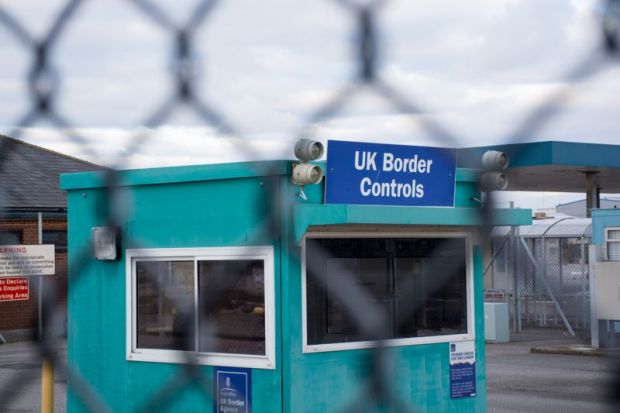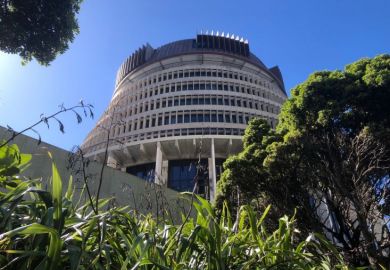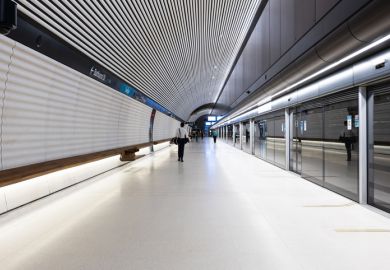A former Conservative cabinet minister has called Universities UK’s proposal to bring back post-study work visas “obvious nonsense” and suggested that such schemes are a route to “mass migration” internationally, during a fringe event at the Tory conference.
Lord Lilley – a member of the increasingly influential European Research Group, which is pushing for a hard Brexit – was countered at the Birmingham conference by University of Sussex vice-chancellor Adam Tickell, who argued that UK universities could be vital in promoting “global Britain” around the world.
Calls by UUK for ministers to remove students from the net migration target and create a two-year post-study work visa were recently rejected by the government’s Migration Advisory Committee.
Lord Lilley said that British universities had achieved their position “not by being allowed to be an artificial route to immigration to this country, but by being good”.
“Sadly, there is an emphasis now in the sector on immigration policy,” he said at the event, hosted by Prospect magazine and the Higher Education Commission.
If students “come, study and leave” then it “doesn’t matter whether they are in net migration or are out”, said Lord Lilley. “It only matters if a significant number of them stay.”
He continued: “Universities have been lobbying for the right of students to stay on more easily for two years of work experience before returning home. Sounds plausible; but it’s obvious nonsense.”
Lord Lilley argued that few employers would want to train individuals for two years only for them to leave the country, saying that post-study work was “only important if it’s a route to stay more or less indefinitely”.
He added: “We ought not to pussyfoot around on this. Are we talking about creating a route for anyone who gets a degree in a British university to stay on indefinitely, or not?”
Later in the event, asked by an audience member why nations such as Australia offered post-study work visas, Lord Lilley said: “Maybe because they want to encourage mass migration. Australia has got a population density of about one-100th of ours.”
Lord Lilley also argued that Brexit would end the “subsidy” of allowing all EU students access to UK student loans when “a far smaller proportion of them pay it back”. He added: “People are willing to pay for it without being subsidised by the British taxpayer. I think we’d still have lots of students from Europe if we didn’t subsidise [them].”
Professor Tickell highlighted the fact that UK universities make a loss on activities such as research. “The balancing item is international student fee income. Which is why we obsess about it. It really matters to us…If it weren’t for that, we would undoubtedly be in a position where we would be making significant cuts to our staffing, which would inevitably reduce the quality of the education that we were able to provide in the UK,” he said.
Seeking to present the audience with a more positive understanding of the role of UK universities, he referred to their “enormous traction around the world” and questioned why they are sometimes not involved in UK government trade missions.
“If we’re involved in trade missions we can actually help project the brilliance of Britain in a much more effective way…I would urge any of you who have influence to think about the power of [universities] to promote global Britain,” he said.
Professor Tickell also said that the EU referendum had been “traumatic for universities”, partly because “20 per cent of research funding in British universities is through the EU.”
Lord Lilley interjected that the money “comes from the British taxpayer, we put twice as much money [into the EU] as we get out”.
Professor Tickell replied that “more money has come to British universities to support research in Britain than was funded to the European research framework programmes by the British taxpayer”.
The vice-chancellor also said that on Brexit, universities “need to move beyond the emotional response to that and we have. The quid pro quo for that is we really need a stable policy environment. And one that doesn’t see universities as being somehow part of the problem rather than being part of the solution for the future.”
Professor Tickell seemed to convince Lord Lilley that major flaws in the International Passenger Survey had vastly overstated figures on the number of international students who overstay their visas.
“I suspect that you’re right,” said Lord Lilley, who called for better figures to be gathered on the entry and exit of overseas students. The Office for National Statistics is already at work on doing this.
Register to continue
Why register?
- Registration is free and only takes a moment
- Once registered, you can read 3 articles a month
- Sign up for our newsletter
Subscribe
Or subscribe for unlimited access to:
- Unlimited access to news, views, insights & reviews
- Digital editions
- Digital access to THE’s university and college rankings analysis
Already registered or a current subscriber? Login








